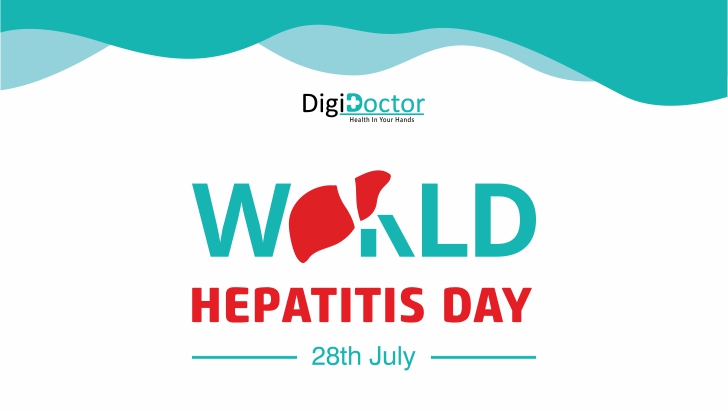Health
- 30 Jun 2020
- Health
Every year on 28th of July World Hepatitis Day (WHD) is observed with the aim to bring the world together under a single theme for raising awareness about the global concern of viral hepatitis and to influence real change.
For the year 2020 the theme is Find the Missing Millions as 290 million people worldwide,are living with viral hepatitis, unaware of it.
On World Hepatitis Day, 28 July, today, we call on people from across the world to take action and raise awareness to find the missing millions on World Hepatitis Day, 28 July,
Understanding Hepatitis, types and nature of spreading.
The three types of viral hepatitis are Hepatitis A, hepatitis B, and hepatitis C. In spite of the fact that each type of viral hepatitis is caused by a different virus and is transmitted in different ways, they all affect the liver and can cause serious health problems.
Hepatitis A
Hepatitis A is an infectious liver infection caused by the hepatitis A virus. People who get infected from hepatitis A may feel in poor health for a few weeks to several months but usually recover completely and do not have lasting liver damage.
Prevention
- The best way to prevent hepatitis A is to get a vaccine. Kids should get a shot around their first birthday.
- Avoid "street" food.
- Wash your hands well after you go to the restroom, change diapers, or before you eat or serve food.
Hepatitis B
Hepatitis B is a disease that affects the liver and is caused by the hepatitis B virus. Among those who become infected, some of them, especially young children, can go on to develop a persistent or lifelong infection. Over a period of time, chronic hepatitis B can cause serious liver damage, and even liver cancer.
Prevention
Apart from a vaccine, the best way to prevent hepatitis B is to keep away from coming in contact with other people's blood and body fluids. That means:
- Not sharing toothbrushes or razors.
- Only getting tattoos and piercings done from shops that can show you how they sterilize their gear.
Hepatitis C
Hepatitis C is a disease of the liver caused by infection from the hepatitis C virus. Majority of people who get infected will develop a chronic, or lifelong, infection. Left untreated, chronic hepatitis C can cause serious health problems including liver disease, liver failure, and even liver cancer.
Patients with hepatitis C often manifest no symptoms so testing is the only way to know if you are infected. Presently there is no vaccine to prevent hepatitis C. Fortunately, treatments are available that can cure hepatitis C.
Prevention
There's no vaccine for hepatitis C. and because most people don't have symptoms for years, many don't know they've been infected.
Prevention
Also known as the hepatitis delta virus, it is an infection that causes the liver to become inflamed. This swelling can weaken liver function and cause long-term liver problems that can include liver scarring and cancer. Such a condition is caused by the hepatitis D virus (HDV).
Hepatitis D can only occur if the person has hepatitis B. Hepatitis D and Hepatitis B both may infect a person at the same time or HDV infection may occur in individuals with chronic HBV infection.
Prevention
- Avoid using anyone else s drug equipment, such as: Needles, spoons, filters, cookers, pipes, and straws.
- Avoid dental, medical or cosmetic procedures that penetrate the skin with unsterilized equipment. Procedures can include: Blood transfusions, acupuncture, piercings, and tattoos.
- Wear latex gloves if you are likely to be in contact with someone else's blood or bodily fluids.
Hepatitis E
Hepatitis E virus causes hepatitis E and the disease targets the liver.
It mostly occurs very commonly in the developing countries. Usually Hepatitis E resolves itself, but sometimes it may develop into acute liver failure.
Eating infected animal products is also one more rare way through which hepatitis E can be transmitted. It can also be passed on to others through blood transfusions. An infected pregnant woman can also transfer the virus to her foetus.
Prevention
There is no vaccine as yet that can prevent the hepatitis E virus. It s most common in less-developed countries in Asia, the Middle East, Africa, and Central America.
You can lower your chances of getting the virus if you:
- Avoid drinking water or use ice that you don t know is clean.
- Stop eating undercooked pork, deer meat, or raw shellfish.
- Wash your hands with soap and water after you use the bathroom, change a diaper, and before you prepare or eat food.
Need Help?
In case you experience any liver related disorders or any ailment that you think is worth medical attention at once, you need not to panic. You can always, and especially during this pandemic time, seek help from us by downloading our easy to access, anytime anywhere online medical consultation app DIGIDOCTOR. It will immediately guide you to an expert medical professional from the required speciality who will take care of all your health related concerns.

